A commercial boiler provides heat and hot water for smaller-scale applications like restaurants and hotels, focusing on efficiency and convenience. In contrast, an industrial boiler is built for high-capacity operations in sectors such as manufacturing and chemical processing, designed to handle larger volumes and demanding environments. Understanding these differences can help you choose the right boiler for your needs. Continue to explore how their features and applications further impact performance and efficiency.
Key insights
- Commercial boilers serve smaller-scale heating needs in environments like restaurants and hotels, while industrial boilers support high-capacity operations in manufacturing sectors.
- Fire-tube boilers are commonly used in commercial applications, whereas water-tube boilers are preferred for larger industrial facilities.
- Efficiency and capacity standards differ, with commercial boilers focusing on lower BTUs and thermal efficiency compared to the higher demands of industrial boilers.
- Maintenance requirements and compliance standards vary; commercial boilers need gas safety certificates, while industrial boilers must meet stricter operational efficiency regulations.
- Energy efficiency is crucial for both, but commercial boilers prioritize advanced technology for cost savings, while industrial boilers emphasize robustness for high output.
Definition and Purpose of Commercial Boilers
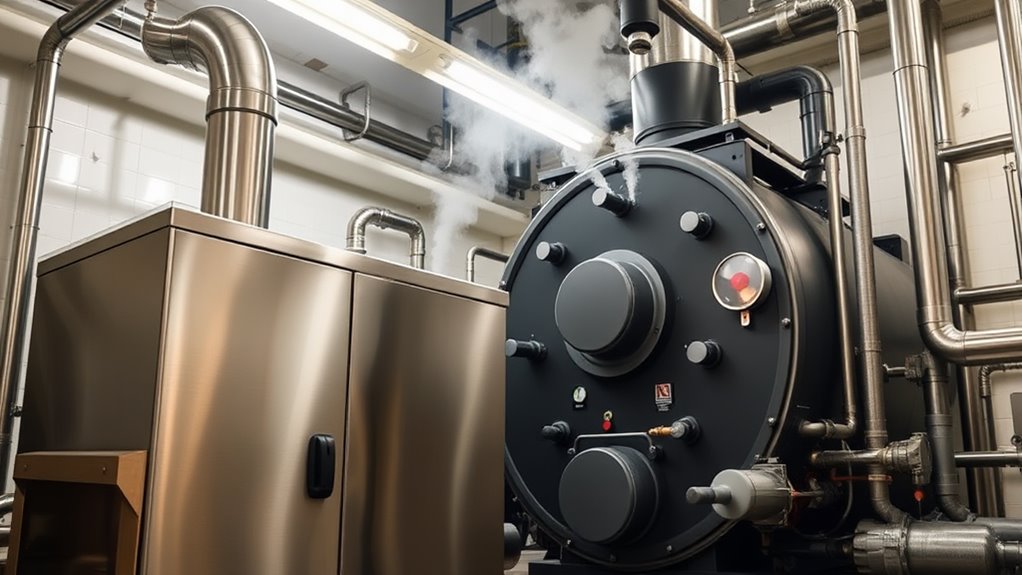
Commercial boilers are essential components in various businesses, providing heat and hot water for a range of applications. Understanding boiler types is vital for optimizing your heating systems. These boilers typically include fire-tube and water-tube designs, each suited for different operational needs. Fire-tube boilers are generally favored for smaller commercial settings due to their efficiency and ease of maintenance, while water-tube boilers are preferred in larger facilities requiring high pressure and capacity. When selecting a boiler, consider factors like fuel type, efficiency ratings, and operational demands. Properly integrated into your heating systems, commercial boilers enhance energy efficiency and reliability, ensuring that your business operates smoothly throughout the year. Additionally, the installation of energy-efficient heating systems can further reduce your carbon footprint while lowering operational costs.
Definition and Purpose of Industrial Boilers
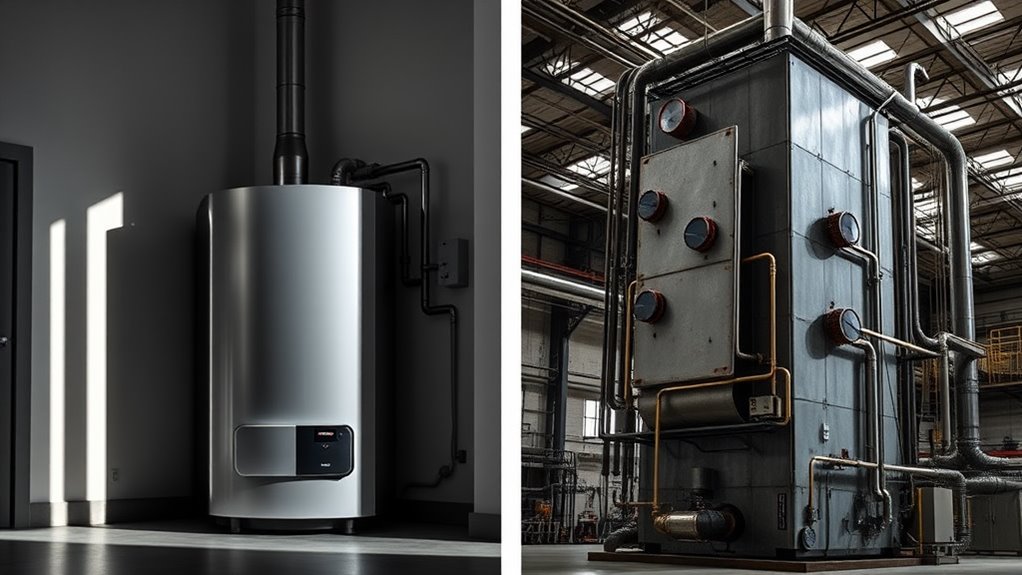
Industrial boilers are essential in various sectors, providing heat and power for processes like manufacturing and chemical production. You'll find that their efficiency and capacity standards are vital for optimizing performance and minimizing operational costs. Understanding these applications helps you choose the right boiler for your specific industrial needs. Additionally, many companies are now considering energy-efficient heating solutions, such as commercial heat pumps, to further enhance their operational efficiency.
Applications of Industrial Boilers
Boilers play an essential role in various industries, serving as fundamental components for heat generation and process optimization. In industrial applications, these systems are important for producing steam and hot water needed for manufacturing processes, power generation, and even space heating. Different boiler types, such as fire-tube and water-tube boilers, cater to specific operational requirements, providing flexibility and efficiency. You'll find industrial boilers in sectors like food processing, chemical manufacturing, and textiles, where they guarantee consistent heat supply and support various applications, including distillation, pasteurization, and drying. Understanding the specific applications of industrial boilers helps you select the right type for your operations, enhancing productivity and guaranteeing compliance with regulatory standards.
Efficiency and Capacity Standards
When selecting a boiler for your operations, understanding efficiency and capacity standards is essential for optimizing performance and guaranteeing compliance. Industrial boilers are typically rated by their thermal efficiency, which measures how effectively they convert fuel into useful energy. This efficiency comparison helps you assess potential cost savings and environmental impacts. Capacity evaluation, on the other hand, involves determining the boiler's output, often expressed in BTUs or horsepower, to ascertain it meets your operational demands. Both efficiency and capacity are critical for maintaining productivity and compliance with industry regulations. By prioritizing these standards, you can enhance your operations, reduce downtime, and improve overall energy management within your facility. Regular maintenance of these systems is crucial for energy efficiency, ensuring they operate at peak performance while minimizing operational costs.
Key Features of Commercial Boilers
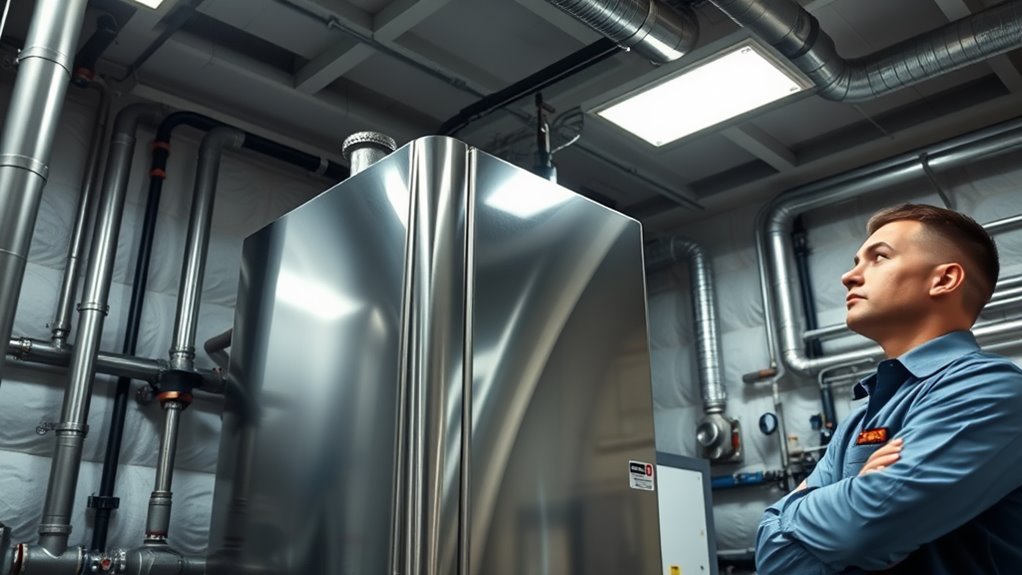
While evaluating options for heating solutions, it is vital to understand the key features of commercial boilers that set them apart from other systems. These boilers are designed for ideal energy efficiency, often incorporating advanced technology that minimizes fuel consumption while maximizing output. They typically operate within a capacity range suitable for commercial facilities, ensuring sufficient heating without excessive energy use. Additionally, commercial boilers are built for ease of maintenance, allowing for regular checks and servicing that extend their operational lifespan. Reliable maintenance practices are essential, as they help identify potential issues before they escalate, reducing downtime and repair costs. Overall, these features make commercial boilers a practical choice for businesses seeking efficient and reliable heating solutions. Regular maintenance, including commercial power flushing, can significantly enhance the performance of these systems.
Key Features of Industrial Boilers
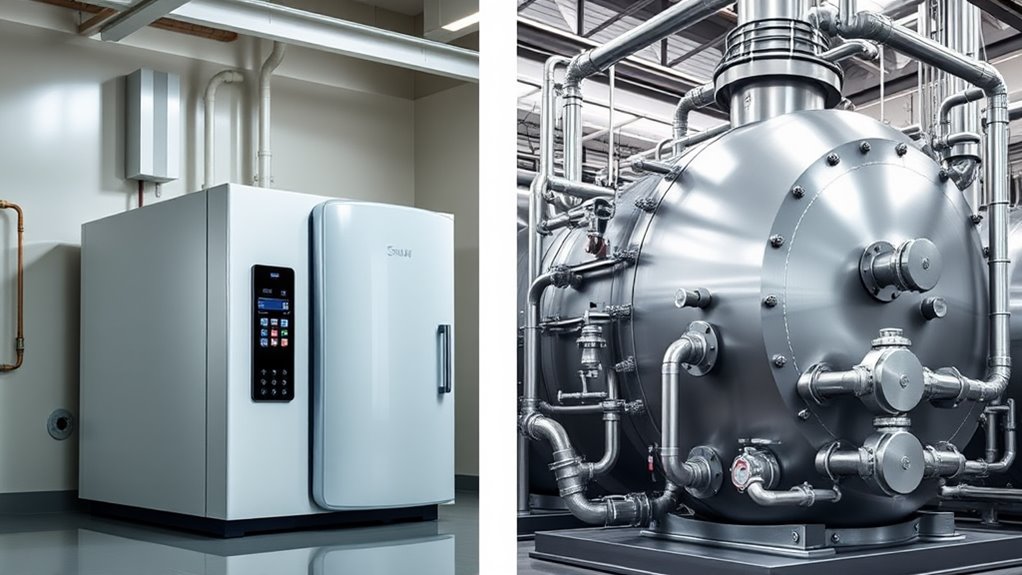
Understanding the key features of industrial boilers is essential for selecting the right heating system for large-scale operations. These systems are designed for high-capacity output and durability, making them suitable for demanding environments. Key features include:
- Robust Construction: Built to withstand extreme pressures and temperatures, ensuring long-lasting performance.
- Energy Efficiency: Advanced designs and technologies minimize fuel consumption, reducing operational costs.
- Simplified Boiler Maintenance: Streamlined access to critical components facilitates regular maintenance, enhancing reliability and uptime. Additionally, regular maintenance is critical for peak boiler performance and longevity, ensuring optimal operation in industrial settings.
Applications of Commercial Boilers
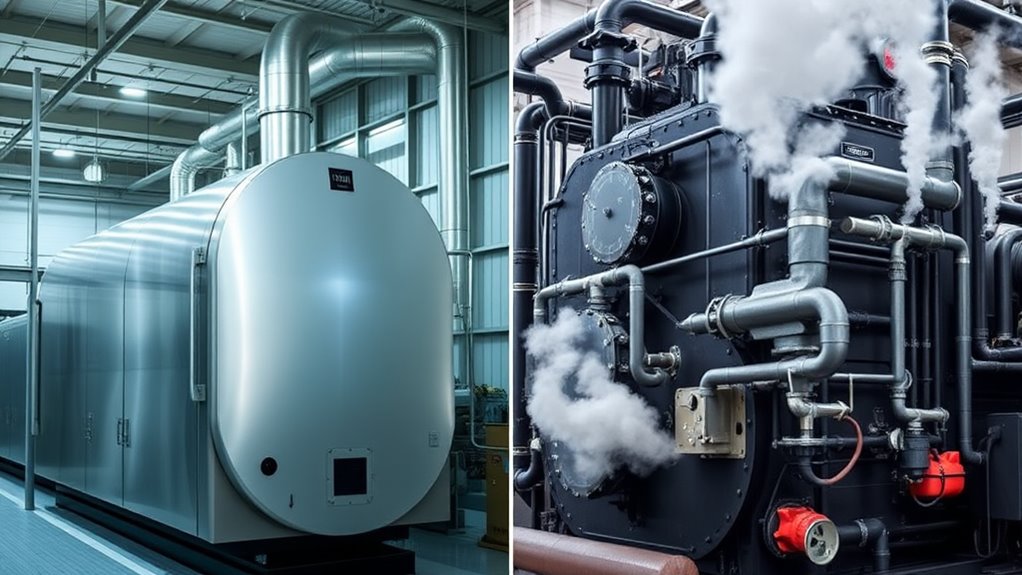
Commercial boilers play an essential role in various industries, providing the necessary heat and hot water for a range of applications. You'll find these boilers commonly used in settings like restaurants, hotels, and office buildings, where efficient heating systems are vital for comfort and operational efficiency. They supply hot water for sanitation, heating spaces, and even supporting processes such as laundry services. Given the significant energy consumption associated with heating, selecting the right commercial boiler can lead to cost savings and lower emissions. By optimizing your heating system, you not only enhance service delivery but also improve overall energy efficiency. Understanding these applications helps you make informed choices for your specific needs, ensuring reliable performance and sustainability. Additionally, maintaining compliance with Commercial Gas Safety Certificates is crucial for ensuring the safety of gas appliances in commercial settings.
Applications of Industrial Boilers
Industrial boilers serve a critical function across numerous sectors, providing the high-temperature steam and hot water necessary for various manufacturing processes. Different boiler types cater to specific industrial applications, ensuring peak performance and efficiency.
- Power Generation: Boilers produce steam for turbines, driving electricity generation in power plants.
- Food Processing: Boilers supply steam for cooking, sterilization, and cleaning processes in food manufacturing.
- Chemical Production: High-pressure steam is essential for reactions, distillation, and drying in chemical plants. Additionally, maintaining boiler pressure is crucial to avoid operational issues like the E119 error code, which indicates low pressure in the system.
These applications highlight the versatility of industrial boilers, which are engineered to meet the demands of high-capacity operations. By understanding the distinct roles of various boiler types, you can make informed decisions regarding your facility's heating needs and overall efficiency.
Frequently Asked Questions
What Is the Average Lifespan of a Commercial Boiler?
The average lifespan of a commercial boiler typically ranges from 15 to 30 years, depending on factors like maintenance and usage. You'll want to prioritize regular inspections and servicing to guarantee boiler longevity. High-efficiency models can extend this lifespan while enhancing commercial efficiency. By investing in quality equipment and adhering to a proper maintenance schedule, you can greatly improve the operational lifespan of your boiler, leading to better performance and lower energy costs.
How Do Boiler Regulations Differ Between Commercial and Industrial Settings?
Boiler regulations vary notably between commercial and industrial settings, primarily due to the scale and complexity of operations. In commercial environments, you focus on boiler compliance with local safety standards, ensuring regular inspections and maintenance. In contrast, industrial settings often face stricter regulations, including more thorough safety standards due to higher operational risks. Understanding these differences helps you navigate compliance effectively, ensuring safety and reliability in both contexts.
What Fuel Types Are Commonly Used in Commercial Boilers?
When considering fuel types for commercial boilers, you'll often find natural gas as a primary choice due to its efficiency and lower emissions. Propane options are also popular, especially in areas where natural gas isn't readily available. These fuels provide reliable heating solutions, but your selection should align with local regulations and availability. Evaluating the pros and cons of each option will help you make an informed decision for your specific needs.
Can Industrial Boilers Be Used in Commercial Applications?
Yes, industrial boilers can be used in commercial applications, but you need to take into account factors like boiler efficiency and capacity. While they're designed for industrial applications, adapting them for commercial use can lead to higher energy consumption and operational costs. You'll want to evaluate the specific heating requirements and efficiency ratings to guarantee they meet your commercial needs effectively. It's essential to align performance with your facility's demands for best results.
What Maintenance Is Required for Commercial Boilers?
To guarantee ideal boiler efficiency, you need to adhere to strict maintenance schedules. Regular inspections, cleaning, and adjustments are essential to prevent breakdowns and enhance performance. You should check the pressure and temperature settings, inspect safety valves, and guarantee proper water quality. Additionally, maintaining burner components and flue systems is vital. By following these maintenance protocols, you'll not only extend the life of your commercial boiler but also improve its operational efficiency.
Summary
In conclusion, understanding the differences between commercial and industrial boilers is essential for selecting the right system for your needs. Commercial boilers typically cater to smaller-scale applications, emphasizing efficiency and space-saving designs, while industrial boilers are built for larger operations, focusing on high capacity and durability. By recognizing these distinctions, you can make informed decisions that enhance operational efficiency and meet specific heating requirements effectively.

